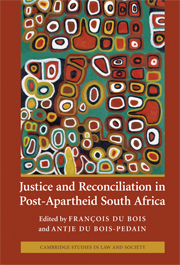Book contents
- Frontmatter
- Contents
- List of tables and figures
- List of contributors
- Acknowledgements
- List of abbreviations
- Introduction
- 1 Reconciliation as surrender: configurations of responsibility and memory
- 2 Radical forgiveness: transforming traumatic memory beyond Hannah Arendt
- 3 Communicating criminal and political responsibility in the TRC process
- 4 The contribution of criminal justice
- 5 Reparation and the forms of justice
- 6 Land restitution and reconciliation in South Africa
- 7 For justice and reconciliation to come: the TRC archive, big business and the demand for material reparations
- 8 Transition, forgiveness and citizenship: the TRC and the social construction of forgiveness
- 9 The evolving legitimacy of the South African Constitutional Court
- 10 Drawing the line: justice and the art of reconciliation
- 11 Post-conflict justice and the reconciliatory paradigm: the South African experience
- Index
- References
1 - Reconciliation as surrender: configurations of responsibility and memory
Published online by Cambridge University Press: 01 July 2009
- Frontmatter
- Contents
- List of tables and figures
- List of contributors
- Acknowledgements
- List of abbreviations
- Introduction
- 1 Reconciliation as surrender: configurations of responsibility and memory
- 2 Radical forgiveness: transforming traumatic memory beyond Hannah Arendt
- 3 Communicating criminal and political responsibility in the TRC process
- 4 The contribution of criminal justice
- 5 Reparation and the forms of justice
- 6 Land restitution and reconciliation in South Africa
- 7 For justice and reconciliation to come: the TRC archive, big business and the demand for material reparations
- 8 Transition, forgiveness and citizenship: the TRC and the social construction of forgiveness
- 9 The evolving legitimacy of the South African Constitutional Court
- 10 Drawing the line: justice and the art of reconciliation
- 11 Post-conflict justice and the reconciliatory paradigm: the South African experience
- Index
- References
Summary
INTRODUCTION
‘Why reconcile?’ In this chapter we attempt to reclaim this foundational, if too often ignored, question and re-situate it at the heart of the theorisation of reconciliation. To ask this question anew, and insistently, is to understand reconciliation as only properly the contingent response, rather than the unconditional outcome, of a society's endeavour to do justice to a past of severe injustice. In a time characterised by what one Nigerian scholar calls the ‘fever of atonement’, where the discourse of reconciliation is deployed as regulative ideal, as corrective and even as substitute of politics, we want to draw attention to the social, historical and institutional contexts within which the call for reconciliation is articulated, and through which that call might be heard, in order to make sense of what is engaged with and of what is elided.
This chapter thematises these engagements around two interpretative axes, responsibility and memory. In essence, our claim is that in the context of the processes of ‘truth and reconciliation’ in South Africa, responsibility is under-determined while memory over-determines. At the intersection of what is thus over-determined and what is under-determined, a reflexivity that is specific to reconciliation is lost sight of. It is this reflexivity that the pivotal question ‘Why reconcile?’ aims to bring back into view.
As regards responsibility, we consider the conditions under which it may be attributed or established, denied or disavowed, by whom and for what.
- Type
- Chapter
- Information
- Publisher: Cambridge University PressPrint publication year: 2009

